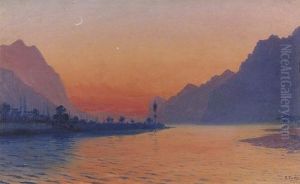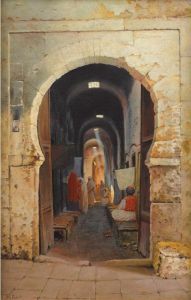Richard Fuchs Paintings
Richard Fuchs was a Jewish composer, architect, and musician born on July 26, 1887, in Karlsruhe, Germany. His life was marked by the tumultuous events of the early 20th century, including the rise of the Nazi regime, which deeply affected his personal and professional life.
Fuchs studied architecture at the Technische Hochschule in Karlsruhe and later developed a career as an architect. However, his true passion lay in music. He was a self-taught composer and his musical works reflected the late Romantic tradition, influenced by composers such as Gustav Mahler and Richard Wagner. Fuchs's compositions included chamber music, symphonic works, lieder (art songs), and choral pieces.
Despite his talent, Fuchs's career in music was hampered by the rise of anti-Semitism in Germany. With the advent of the Nazi regime and its oppressive policies against Jews, Fuchs, being Jewish, faced significant discrimination. His works were deemed 'degenerate' and were banned from being performed in public. This not only stifled his ability to work as a composer but also endangered his life.
In light of the increasing persecution, Fuchs attempted to emigrate from Germany. In 1939, he succeeded in fleeing to New Zealand, where he hoped to continue his work as a composer and architect. Unfortunately, he found little opportunity to engage in professional music-making in his new home, as the local music scene was not very receptive to his European late Romantic style.
Fuchs continued to compose while in New Zealand, but he struggled with the lack of recognition and the limited performance opportunities for his music. His efforts to contribute to the cultural life of his new country were largely unacknowledged, and he remained a relatively obscure figure in the world of music.
Richard Fuchs passed away on September 21, 1947, in Wellington, New Zealand. His music was largely forgotten for many years, but there has been a recent resurgence of interest in his compositions. Scholars and musicians have started to explore his works, which stand as a testament to his enduring creative spirit in the face of adversity.








